Throughout this site there are many discussions of economic indicators. This post is the latest in a series of posts indicating facets of U.S. economic weakness or a notably low growth rate.
The level and trend of economic growth is especially notable at this time. As seen in various estimates, the probability of recession has grown significantly.
As seen in the October 2022 Wall Street Journal Economic Forecast Survey the consensus (average estimate) among various economists is for .22% GDP in 2022, .44% GDP in 2023, 1.82% GDP in 2024, and 2.12% GDP in 2025.
Charts Indicating U.S. Economic Weakness
Below are a small sampling of charts that depict weak growth or contraction, and a brief comment for each:
The Yield Curve (T10Y2Y)
Many people believe that the Yield Curve is a leading economic indicator for the United States economy.
On March 1, 2010, I wrote a post on the issue, titled “The Yield Curve As A Leading Economic Indicator.”
While I continue to have the stated reservations regarding the “Yield Curve” as an indicator, I do believe that it should be monitored.
The U.S. Yield Curve (one proxy seen below) has turned negative and is (all things considered) notably low when viewed from a long-term perspective. Below is the spread between the 10-Year Treasury Constant Maturity and the 2-Year Treasury Constant Maturity from June 1976 through the November 4, 2022 update, showing a value of -.49% [10-Year Treasury Yield (FRED DGS10) of 4.14% as of the November 4 update, 2-Year Treasury Yield (FRED DGS2) of 4.71% as of the November 4 update]:
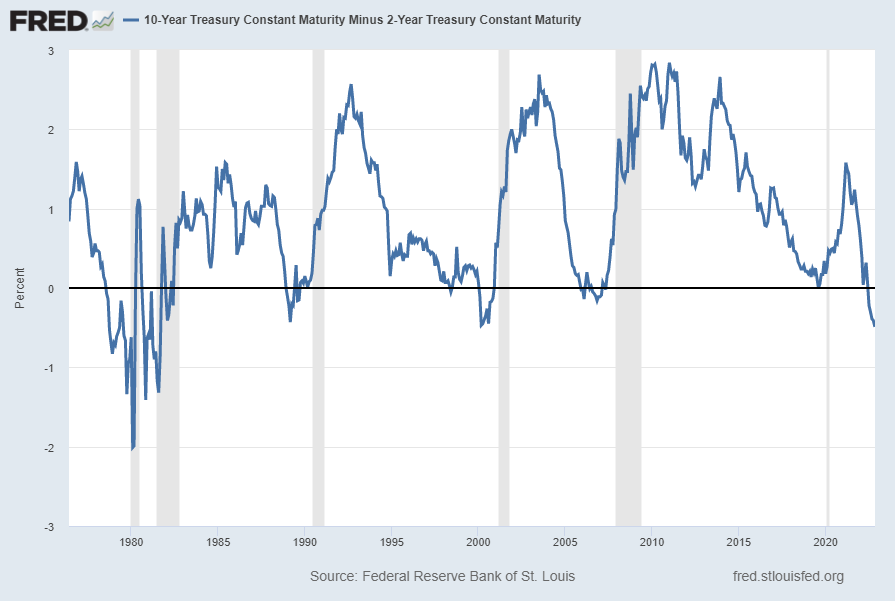
source: Federal Reserve Bank of St. Louis, 10-Year Treasury Constant Maturity Minus 2-Year Treasury Constant Maturity [T10Y2Y], retrieved from FRED, Federal Reserve Bank of St. Louis; accessed November 4, 2022: https://fred.stlouisfed.org/series/T10Y2Y
__
Real Average Hourly Earnings
Various measures of (nominal) average hourly earnings continue to show significant growth. However, due to continuing high inflation, Real Average Hourly Earnings continues to decline. Shown below is a chart of earnings measures as seen in The Economics Daily of October 20, 2022 titled “Real average hourly earnings down 3.0 percent from September 2021 to September 2022”:
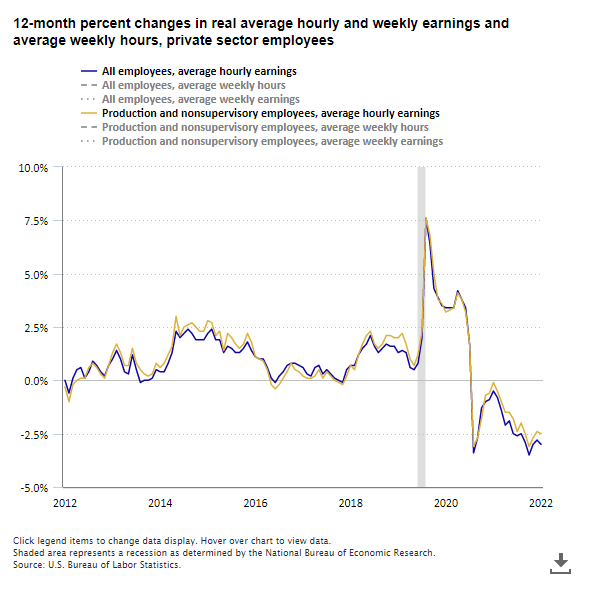
source: Bureau of Labor Statistics, U.S. Department of Labor, The Economics Daily, Real average hourly earnings down 3.0 percent from September 2021 to September 2022 at https://www.bls.gov/opub/ted/2022/real-average-hourly-earnings-down-3-0-percent-from-september-2021-to-september-2022.htm (visited November 07, 2022).
__
Real Median Household Income In The United States (MEHOINUSA672N)
In mid-September 2022 the Real Median Household Income statistic was updated. The figure is $70,784:
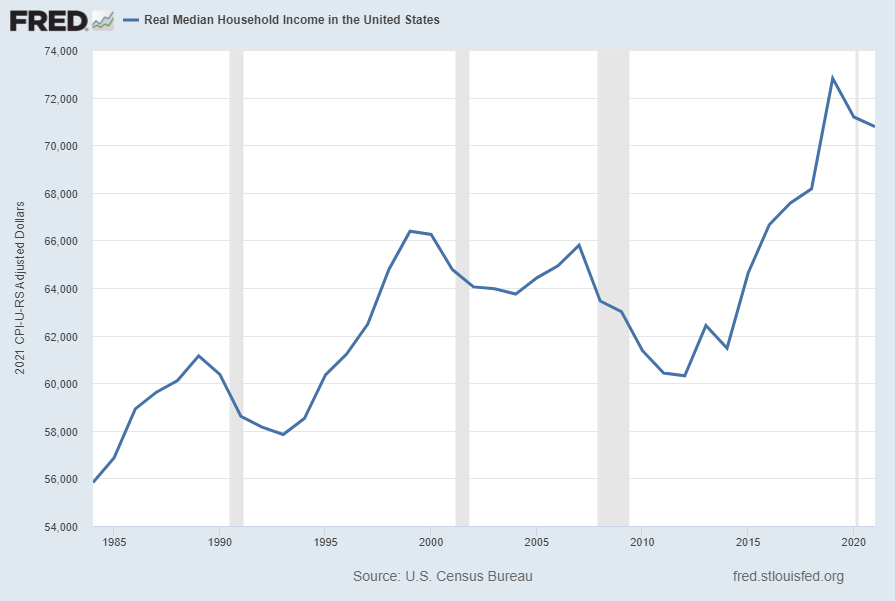
This figure, which is released annually, shows a -.6 Percent Change From Year Ago:
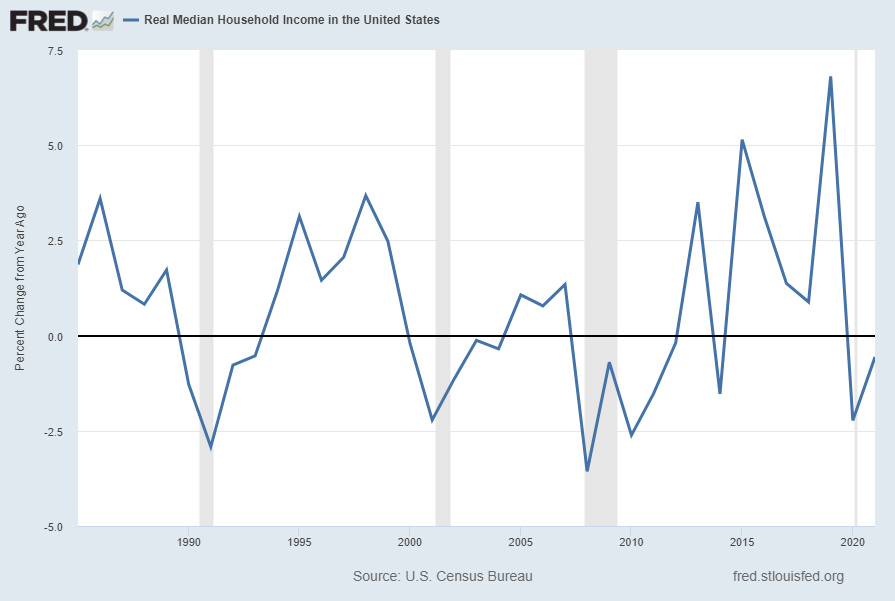
source: U.S. Census Bureau, Real Median Household Income in the United States [MEHOINUSA672N], retrieved from FRED, Federal Reserve Bank of St. Louis; accessed November 7, 2022: https://fred.stlouisfed.org/series/MEHOINUSA672N
__
Personal Savings Rate (PSAVERT)
The Personal Saving Rate has been very volatile since 2020, and has now declined to nearly the lowest levels seen in the entire data series.
As seen below, the Personal Savings Rate is now at 3.1% through September 2022, as of the October 28, 2022 update:
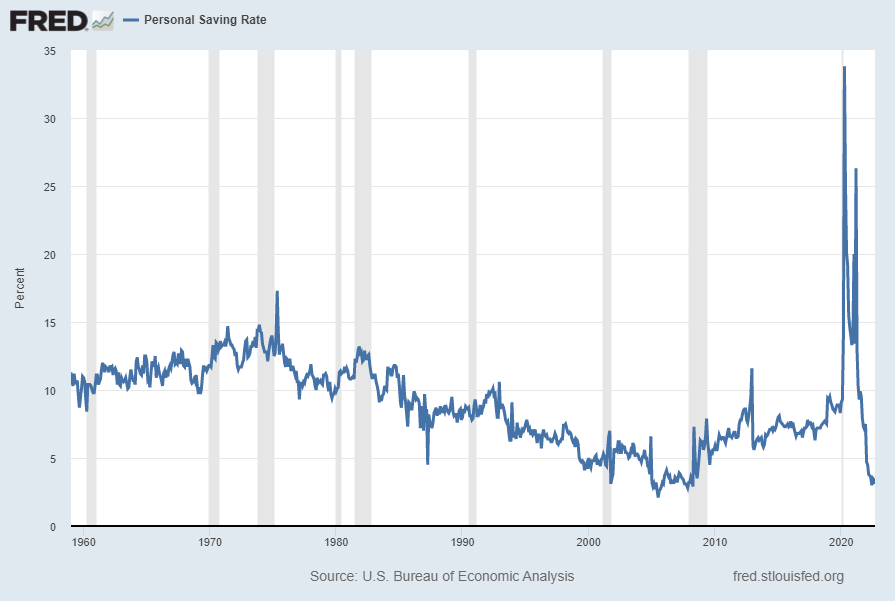
source: U.S. Bureau of Economic Analysis, Personal Saving Rate [PSAVERT], retrieved from FRED, Federal Reserve Bank of St. Louis; accessed November 6, 2022: https://fred.stlouisfed.org/series/PSAVERT
__
Other Indicators
As mentioned previously, many other indicators discussed on this site indicate weak economic growth or economic contraction, if not outright (gravely) problematical economic conditions.
_____
The Special Note summarizes my overall thoughts about our economic situation
SPX at 3769.18 as this post is written